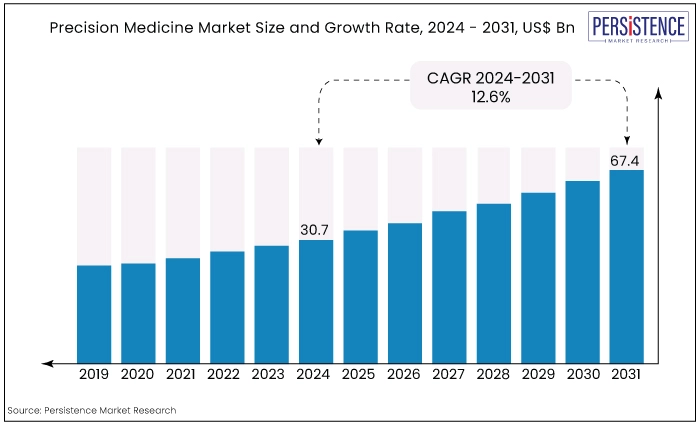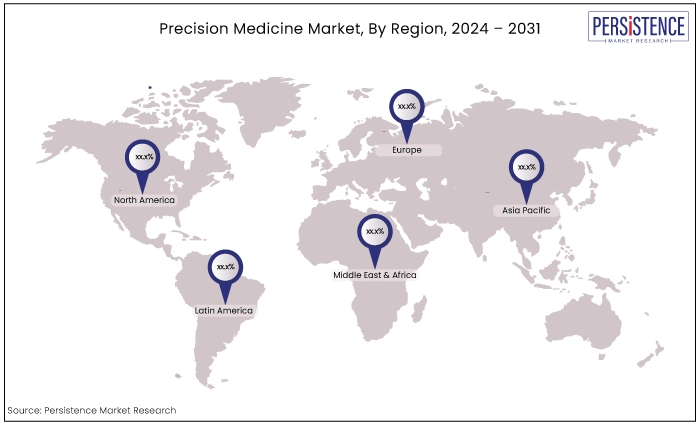Industry: Healthcare
Published Date: July-2024
Format: PPT*, PDF, EXCEL
Delivery Timelines: Contact Sales
Number of Pages: 169
Report ID: PMRREP12646
The global market for precision medicine is expected to rise from US$30.7 Bn in 2024 to US$67.4 Bn by the end of 2031. The market is anticipated to secure a CAGR of 12.6% during the forecast period from 2024 to 2031.
Key Highlights of the Market
|
Attributes |
Key Insights |
|
Market Size (2024E) |
US$30.7 Bn |
|
Projected Market Value (2031F) |
US$67.4 Bn |
|
Global Market Growth Rate (CAGR 2024 to 2031) |
12.6% |
|
Historical Market Growth Rate (CAGR 2019 to 2023) |
10.9% |
The precision medicine market is revolutionizing healthcare by offering personalized treatment plans based on an individual's unique genetic makeup, environment, and lifestyle factors.
Precision medicine, also known as personalized medicine, represents a transformative approach to healthcare that considers individual differences in genes, environment, and lifestyle. It involves tailoring medical treatment and interventions to the characteristics of each patient to achieve the best outcomes.
Key components of this market include diagnostic tests, targeted therapies, molecular profiling technologies, and data analytics platforms. These innovations enable healthcare providers to better understand the genetic makeup of patients, predict disease susceptibility, and customize treatment plans accordingly.
The market has been notably expanding because of many factors including advancements in genomic sequencing technologies, increased understanding of the genetic basis of diseases, and growing demand for more effective and personalized healthcare solutions.
Government initiatives, research funding, and collaborations between academia, industry, and healthcare providers have also fueled growth in this sector.
Leading stakeholders in the market include pharmaceutical companies, biotechnology firms, diagnostic companies, academic research institutions, and healthcare providers. These entities collaborate to develop and commercialize new diagnostic tools and therapies that can target specific genetic mutations or biomarkers associated with diseases.
Historic Growth and Course Ahead
Precision medicine gained traction particularly in oncology, where targeted therapies based on genetic mutations showed promise in improving treatment outcomes for cancer patients.
Precision medicine applications expanded beyond oncology into areas such as cardiovascular diseases, rare genetic disorders, neurology, and infectious diseases. The market exhibited a CAGR of 10.9% during the historical period.
Larger pharmaceutical companies and biotech firms increased their investments in precision medicine, leading to market consolidation and strategic acquisitions.
Increased patient awareness and demand for personalized healthcare solutions contributed to market growth, with patients actively seeking genetic testing and targeted therapies.
The market is estimated to continue growing driven by ongoing technological advancements, expanding applications across disease areas, and increasing global adoption.
Continued improvements in genomic sequencing, proteomics, and metabolomics will enable deeper insights into disease mechanisms and personalized treatment options.
Greater adoption of precision medicine approaches in emerging markets, supported by improving healthcare infrastructure and rising healthcare expenditures. The market for precision medicine is projected to record a CAGR of 12.6% during the forecast period from 2024 to 2031.

A Notable Shift Towards Addressing Rare Diseases
An increasing shift toward addressing rare diseases is a key driver for precision medicine market growth. Precision medicine has significantly improved the diagnosis and management of rare diseases by identifying disease-specific biomarkers and genetic mutations.
Advances in genomic sequencing have facilitated the discovery of rare disease-causing variants, enabling accurate and timely diagnosis for patients with rare and undiagnosed condition.
The pharmaceutical industry has increasingly focused on developing orphan drugs targeted at rare diseases. Regulatory incentives, such as orphan drug designations and market exclusivity, have encouraged investments in rare disease research and development.
Precision medicine approaches, including gene therapies and molecularly targeted treatments, offer promising avenues to treat previously untreatable rare diseases.
Advocacy groups and patient organizations have played a crucial role in raising awareness about rare diseases and advocating for research funding and regulatory support.
Collaborative efforts between academia, industry, and patient communities have accelerated the translation of scientific discoveries into clinical applications, facilitating access to personalized therapies for patients with rare diseases.
Advancements in Genomics, and Molecular Biology
The advent of next-generation sequencing has propelled us into an era where decoding entire genomes has become faster, more affordable, and more precise than ever before.
The technology allows us to uncover the intricate genetic blueprints underlying diseases, offering insights into genetic mutations, variations, and biomarkers that influence disease susceptibility and progression.
Armed with genomic insights, precision medicine has ushered in a paradigm shift toward targeted therapies tailored to the genetic profiles of individual patients.
The discovery of biomarkers molecular signposts indicative of disease presence, progression, or treatment response has revolutionized diagnostics and personalized treatment.
From genetic mutations and gene expression patterns to circulating tumor DNA in liquid biopsies, biomarkers offer real-time snapshots of disease dynamics, guiding clinicians in making informed decisions on patient management.
At the intersection of genomics, AI, and precision medicine lies the promise of personalized healthcare tailored to each patient’s unique genetic makeup. This convergence not only enhances diagnostic precision and treatment efficacy but also empowers patients with proactive strategies for disease prevention and management.
Complexity of Data Integration
Precision medicine relies heavily on the integration and analysis of large-scale genomic, clinical, and personal health data. Ensuring the privacy and security of this sensitive information is paramount to maintaining patient trust and regulatory compliance.
Data breaches, unauthorized access, and concerns over data ownership and consent can impede data sharing and collaboration essential for advancing precision medicine market research and applications.
The diversity and complexity of healthcare data sources pose significant challenges in standardizing formats and ensuring interoperability across different systems and platforms.
Variations in data quality, terminology, and integration capabilities hinder seamless data exchange and comprehensive analysis. This fragmentation limits the ability to derive meaningful insights from integrated datasets, potentially impacting the accuracy and reliability of clinical decision-making in precision medicine.
Regulatory Challenges
Precision medicine involves the use of advanced technologies, personalized treatments, and genomic data that often challenge existing regulatory frameworks. Regulatory agencies worldwide struggle to keep pace with the rapid evolution of genomic testing, targeted therapies, and diagnostic tools.
Unclear guidelines and varying regulatory requirements across different regions can hinder the timely approval and commercialization of precision medicine products and services. Reimbursement policies for precision medicine therapies and diagnostic tests are another critical barrier.
Unlike traditional treatment modalities with established reimbursement pathways, precision medicine often requires specialized testing and targeted therapies that may not fit neatly into existing reimbursement models.
Payers may hesitate to cover these treatments due to uncertainties regarding their clinical utility, cost-effectiveness, and long-term outcomes, leading to challenges in market access and adoption.
Expanding Application Beyond Oncology
While oncology has been a primary focus, there is a growing opportunity to expand precision medicine applications into other disease domains such as cardiovascular diseases, neurodegenerative disorders, rare genetic diseases, and infectious diseases.
Advances in genomic sequencing, biomarker discovery, and targeted therapies are paving the way for personalized approaches to a broader spectrum of health conditions.
Tailoring treatments for children with genetic disorders or pediatric cancers presents a key opportunity.
Developments in pediatric genomics and the adaptation of precision medicine principles to pediatric populations are expected to drive innovation and improve outcomes in pediatric healthcare.
Integration of Multi-Omics Data and AI
Integrating genomic data with other omics data such as proteomics, metabolomics, and epigenomics provides a comprehensive understanding of disease mechanisms and personalized treatment responses.
Market players can capitalize on developing technologies and platforms that facilitate multi-omics data integration and analysis. AI-driven algorithms are increasingly being utilized for predictive analytics, patient stratification, and drug discovery in precision medicine.
Opportunities lie in developing AI-powered tools that can interpret complex biological data, predict treatment outcomes, and optimize personalized treatment plans based on individual patient profiles.
Growing Emphasis on Patient-Centered Care
There is a growing emphasis on patient-centered care and shared decision-making in healthcare. Precision medicine market players can differentiate themselves by offering personalized healthcare solutions that empower patients with access to their genetic information, treatment options, and participation in clinical trials.
Addressing concerns around data privacy and security is critical for maintaining patient trust and compliance with regulatory requirements.
Market players can invest in robust data governance frameworks, secure data-sharing platforms, and transparent consent mechanisms to safeguard patient data while promoting collaborative research and innovation.
Inhibitor Drugs Segment Occupies the Largest Market Share
The inhibitor drugs segment held the largest share in the market due to the factors such as a large number of commercially approved drugs, and better effectiveness of inhibitor drugs.
In 2023, the inhibitor drugs segment accounted for the largest share of the market owing to factors including observed better effectiveness of inhibitor drugs, and large number of commercially approved drugs.
Besides, inhibitor drugs cover significant indications such as oncology, and rare diseases among others.
Compared to some new areas of precision medicine like gene therapy, inhibitor drugs have a long track record of success. Doctors are familiar with their use and they have shown to be effective in treating various conditions
Inhibitor drugs target a wide variety of diseases, including cancer, rare diseases, and others. This versatility makes them applicable to a larger patient pool, further inflating their market share.
Oncology Emerging as the Leading Sector
Cancer is a major global health concern, with increasing incidence rates worldwide. Precision medicine offers tailored treatment options based on the genetic and molecular characteristics of tumors, improving outcomes compared to traditional therapies.
The understanding of cancer biology at the molecular level has expanded significantly. This knowledge allows for the development of targeted therapies that specifically address the genetic mutations and pathways driving cancer growth, leading to more effective treatments.
The oncology segment of the precision medicine market is driven by significant investment in research and development, collaborations between academia and industry, and the commercialization of innovative therapies.
Availability of Advanced Healthcare Infrastructure Drives North America’s Market
The region boasts advanced healthcare infrastructure with well-equipped hospitals, research institutions, and laboratories. This facilitates research and development in precision medicine, fostering innovation and early adoption of new technologies.
The presence of leading pharmaceutical and biotechnology companies in North America fuels advancements in precision medicine. These companies invest heavily in research and development of novel drugs and diagnostics tailored to individual needs.
The prevalence of chronic diseases like cancer, cardiovascular diseases, and diabetes creates a significant demand for personalized treatment options. This drives the growth of the precision medicine market in North America.
Patients and healthcare providers in North America are increasingly aware of the benefits of personalized medicine. This demand for tailored treatment plans further fuels market growth.

Collaboration among industry players, academic institutions, and healthcare providers is common. Partnerships enable access to complementary expertise, resources, and technologies, facilitating accelerated product development and market penetration.
Companies that prioritize patient engagement, education, and empowerment in precision medicine solutions enhance their competitive position. Providing comprehensive support services and access to information fosters patient loyalty and satisfaction.
May 2024
OM1, a frontrunner in real-world evidence for personalized medicine, launched three new products: OM1 Orion, OM1 Lyra, and OM1 Polaris. These tools are powered by PhenOMTM, an AI platform that utilizes patient data to personalize treatment and accelerate clinical research.
|
Attributes |
Details |
|
Forecast Period |
2024 to 2031 |
|
Historical Data Available for |
2019 to 2023 |
|
Market Analysis |
US$ Billion for Value |
|
Key Regions Covered |
|
|
Key Countries Covered |
|
|
Key Market Segments Covered |
|
|
Key Companies Profiled |
|
|
Report Coverage |
|
|
Customization & Pricing |
Available upon request |
By Type
By Indication
By End User
By Region
To know more about delivery timeline for this report Contact Sales

Advancements in genomics and molecular biology is a key factor for market growth.
Pfizer Inc., Bristol Myers Squibb, and Hoffmann-La Roche Ltd
Expansion of applications beyond oncology is a key opportunity in the market.
The market is expected to increase from US$30.7 Bn in 2024 to US$67.4 Bn by the end of 2031.
Availability of advanced healthcare infrastructure drives North America market.